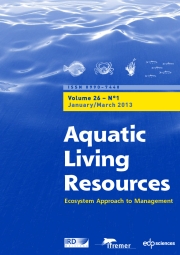Crossref Citations
This article has been cited by the following publications. This list is generated based on data provided by
Crossref.
Ali, M
Nicieza, A
and
Wootton, R J
2003.
Compensatory growth in fishes: a response to growth depression.
Fish and Fisheries,
Vol. 4,
Issue. 2,
p.
147.
Mambrini, M.
Médale, F.
Sanchez, M.P.
Recalde, B.
Chevassus, B.
Labbé, L.
Quillet, E.
and
Boujard, T.
2004.
Selection for growth in brown trout increases feed intake capacity without affecting maintenance and growth requirements1.
Journal of Animal Science,
Vol. 82,
Issue. 10,
p.
2865.
Unniappan, Suraj
Cerdá-Reverter, José Miguel
and
Peter, Richard E
2004.
In situ localization of preprogalanin mRNA in the goldfish brain and changes in its expression during feeding and starvation.
General and Comparative Endocrinology,
Vol. 136,
Issue. 2,
p.
200.
Mambrini, Muriel
Sanchez, Marie-Pierre
Chevassus, Bernard
Labbé, Laurent
Quillet, Edwige
and
Boujard, Thierry
2004.
Selection for growth increases feed intake and affects feeding behavior of brown trout.
Livestock Production Science,
Vol. 88,
Issue. 1-2,
p.
85.
Nikki, Jyrki
Pirhonen, Juhani
Jobling, Malcolm
and
Karjalainen, Juha
2004.
Compensatory growth in juvenile rainbow trout, Oncorhynchus mykiss (Walbaum), held individually.
Aquaculture,
Vol. 235,
Issue. 1-4,
p.
285.
MURASHITA, Koji
KUBOTA, Satoshi
KOFUJI, Patricia Yumi Morimoto
HOSOKAWA, Hidetsuyo
and
MASUMOTO, Toshiro
2005.
Trypsin restoration time in the pyloric ceca of yellowtail Seriola quinqueradiata.
Fisheries Science,
Vol. 71,
Issue. 6,
p.
1274.
Sheppard, S.C.
Sheppard, M.I.
and
Siclet, F.
2006.
Parameterization of a dynamic specific activity model of 14C transfer from surface water-to-humans.
Journal of Environmental Radioactivity,
Vol. 87,
Issue. 1,
p.
15.
Øverli, Øyvind
Sørensen, Christina
Kiessling, Anders
Pottinger, Tom G.
and
Gjøen, Hans M.
2006.
Selection for improved stress tolerance in rainbow trout (Oncorhynchus mykiss) leads to reduced feed waste.
Aquaculture,
Vol. 261,
Issue. 2,
p.
776.
Dmitriew, C.
Cooray, M.
and
Rowe, L.
2007.
Effects of early resource-limiting conditions on patterns of growth, growth efficiency, and immune function at emergence in a damselfly (Odonata: Coenagrionidae).
Canadian Journal of Zoology,
Vol. 85,
Issue. 3,
p.
310.
Montserrat, N.
Gabillard, J.C.
Capilla, E.
Navarro, M.I.
and
Gutiérrez, J.
2007.
Role of insulin, insulin-like growth factors, and muscle regulatory factors in the compensatory growth of the trout (Oncorhynchus mykiss).
General and Comparative Endocrinology,
Vol. 150,
Issue. 3,
p.
462.
MEKA, J. M.
and
MARGRAF, F. J.
2007.
Using a bioenergetic model to assess growth reduction from catch‐and‐release fishing and hooking injury in rainbow trout, Oncorhynchus mykiss.
Fisheries Management and Ecology,
Vol. 14,
Issue. 2,
p.
131.
DMITRIEW, C.
and
ROWE, L.
2007.
Effects of early resource limitation and compensatory growth on lifetime fitness in the ladybird beetle (Harmonia axyridis).
Journal of Evolutionary Biology,
Vol. 20,
Issue. 4,
p.
1298.
Barreto, Rodrigo Egydio
de Miranda Cabral Gontijo, Álisson Marques
and
Delicio, Helton Carlos
2008.
Correlations Between Pre- and Post-Fasting Growth in Nile Tilapia.
Journal of Applied Animal Research,
Vol. 34,
Issue. 2,
p.
113.
2008.
Animal welfare aspects of husbandry systems for farmed trout ‐ Scientific Opinion of the Panel on Animal Health and Welfare.
EFSA Journal,
Vol. 6,
Issue. 10,
Gourley, Meagan E.
and
Kennedy, Christopher J.
2009.
Energy allocations to xenobiotic transport and biotransformation reactions in rainbow trout (Oncorhynchus mykiss) during energy intake restriction.
Comparative Biochemistry and Physiology Part C: Toxicology & Pharmacology,
Vol. 150,
Issue. 2,
p.
270.
Blanquet, Isidro
and
Oliva-Teles, Aires
2009.
Effect of feed restriction on the growth performance of turbot (Scophthalmus maximusL.) juveniles under commercial rearing conditions.
Aquaculture Research,
Tian, Xiangli
Fang, Jinghui
and
Dong, Shuanglin
2010.
Effects of starvation and recovery on the growth, metabolism and energy budget of juvenile tongue sole (Cynoglossus semilaevis).
Aquaculture,
Vol. 310,
Issue. 1-2,
p.
122.
Millot, S.
Péan, S.
Leguay, D.
Vergnet, A.
Chatain, B.
and
Bégout, M.-L.
2010.
Evaluation of behavioral changes induced by a first step of domestication or selection for growth in the European sea bass (Dicentrarchus labrax): A self-feeding approach under repeated acute stress.
Aquaculture,
Vol. 306,
Issue. 1-4,
p.
211.
Myszkowski, Leszek
Kamler, Ewa
and
Kwiatkowski, Sławomir
2010.
Weak compensatory growth makes short-term starvation an unsuitable technique to mitigate body deformities of Tinca tinca juveniles in intensive culture.
Reviews in Fish Biology and Fisheries,
Vol. 20,
Issue. 3,
p.
381.
Wang, Jie
Niu, Cuijuan
Huang, Chenxi
Rummer, Judie L.
and
Xie, Zhigang
2011.
Compensatory Growth in Juvenile Freshwater Turtles,Chinemys reevesii, Following Feed Deprivation.
Journal of the World Aquaculture Society,
Vol. 42,
Issue. 1,
p.
82.

